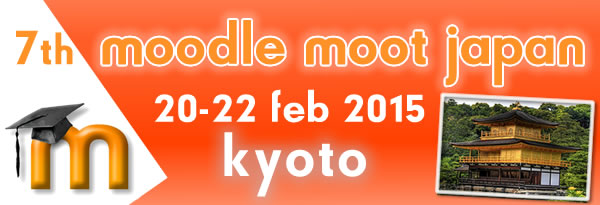Moot 2015 Information, Submissions & Registration
Section outline
-
Keep up-to-date and ask questions about the upcoming Moodle Moot!
-

Martin Dougiamas (remote presentation)
Founder and lead developer of Moodle
Title: Feedback
Feedback is one of the universal laws of education. I will be discussing how it works and how you can use it to design your education program.

Shoji Kajita, Ph. D
IT Planning Office, Institute for Information Management and Communication, Kyoto University
Title: The History and the Development of LMS: Current Status and Challenges of New Teaching and Learning Environment Redefined by Commoditized Learning Management System
Learning Management System (LMS), which is also referred to as ‘Course Management System’ (CMS) from a teaching viewpoint, had rapidly gained popularity since around 1998, and has become commoditized in higher educational institutions (especially in north American institutions). Although Japanese higher educational institutions are almost ten years behind, the LMS/CMS has also penetrated into the Japanese teaching and learning environment, and we have seen an increasing number of use cases unbounded to PC terminal rooms such as MOOC and Flipped Classroom, due to the BYOD (Bring Your Own Device) policy. As a result, it is becoming more important to integrate learning spaces in the cyber world and those in the physical world. This talk addresses the current status and challenges of new teaching and learning environment in the commoditized LMS/CMS.

Marina Glancy
Development Process Manager, Moodle Head Quarters
Title: What Does 'Open-source' and 'Community-driven' Mean for Moodle Development?
When you start working with Moodle and explore it’s potential you might not even realise how many people were involved in the preparation of the final product. Thousands of users around the world participate not only in development but also in suggesting features, providing support, testing, translations and writing documentation for Moodle. In my presentation I will show many different ways of how Moodle users can actively participate in the product and how Moodle HQ organises these processes. Being open source makes code contributions much easier. By allowing everybody to take part in the code development, Moodle can satisfy the requirements of a broad user base and provide a wider set of features compared to boxed distributions developed by one team. This diversity of code can bring some disadvantages however, which I will also mention. I will cover what being open source means for security and how Moodle addresses it.
-
This is the process you need to follow to register to the Moot (conference) and/or become a member of the Moodle Association of Japan.
1) First, read the "Membership Categories and Fees" page below and make sure you understand the different member categories.
2) Next, please go to the following page and create your own account in this MAJ moodle site.
https://moodlejapan.org/login/index.php
3) After logging in to this site with your new account, please come back to this page and click the "Moot 2015 Participant Registration and MAJ Membership" link below, then you will be connected to the ConfTool conference management system. There you can register yourself for the moot (and membership).
4) For payment, follow the directions in "Payment methods" page below. Thank you.
Background Colour
Text Colour
Font Face
Font Size
Image Visibility
Letter Spacing
Line Height
Link Highlight
Font Kerning
Text Alignment
Paragraph Width

